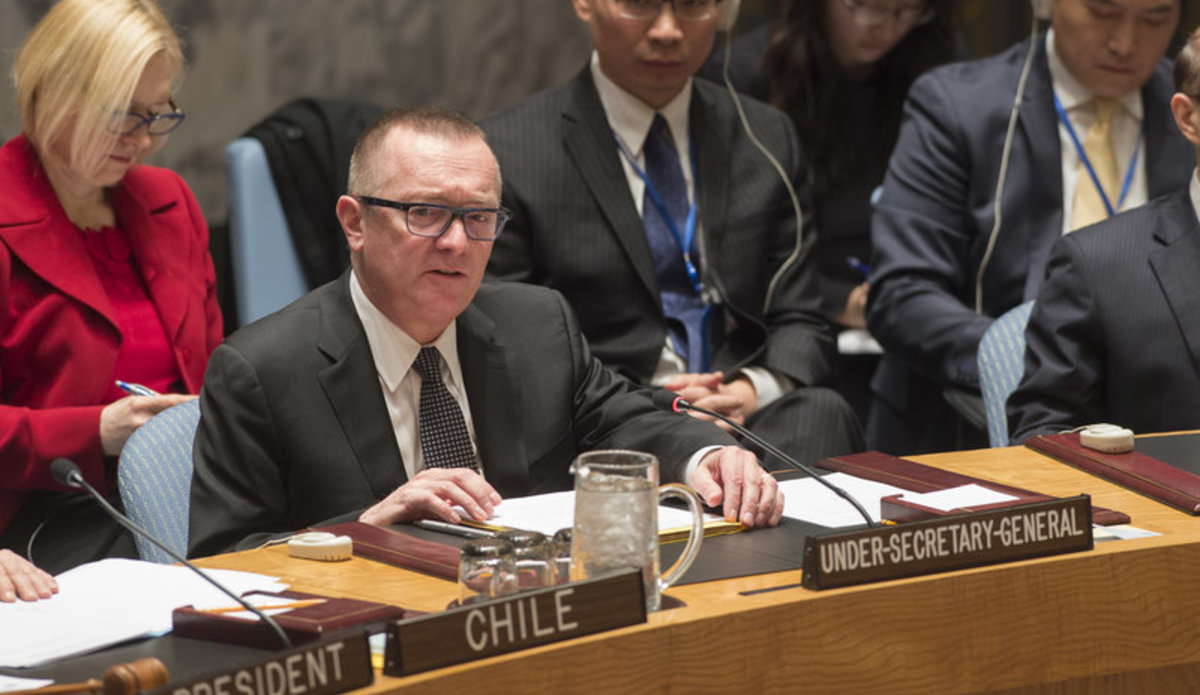Mr. President, distinguished members of the Council,
Throughout the conflict in Ukraine, and repeatedly in recent weeks, the Secretary-General has called for de-escalation, restraint, and protection of civilians. We deeply regret that these calls appear to have fallen on deaf ears.
In just five days since we last met on 21 January, close to fifty civilians have been killed and nearly 150 have been seriously wounded.
On 22 January, over a dozen civilians died when rockets hit their trolleybus in Donetsk city. The same day, at least ten civilians were killed amidst heavy fighting in the city of Horlivka.
On Saturday, 24 January, a barrage of attacks with multi-launch rocket systems hit the city of Mariupol, destroying buildings and impacting a market filled with civilians. Dozens of people lost their lives, including women and children, and over one hundred were wounded. The OSCE Special Monitoring Mission reported, based on crater analysis, that the rockets originated from territory controlled by the so-called “Donetsk People’s Republic”.
Mr. President, distinguished members of the Council,
Mariupol lies outside of the immediate conflict zone. The conclusion can thus be drawn that the entity which fired these rockets knowingly targeted a civilian population. This would constitute a violation of international humanitarian law. We must all send an unequivocal message: The perpetrators must be held accountable and brought to justice.
On 23 January, the leader of the so-called “Donetsk People's Republic” announced a boycott of future “consultations” with the Trilateral Contact Group, a unilateral withdrawal from the cease-fire and threatened to seize further territory, with a plan that includes pushing the front line all the way to the borders of Donetsk oblast. As the Secretary-General stated on 24 January, this constitutes a violation of their commitments under the Minsk accords. We call directly on the rebels to immediately cease their provocative and violent actions, to abide by international law and to make good on their commitments.
We also urge the leadership of the Russian Federation to use their influence to call on the rebels to cease hostilities immediately. This will be a critical step in stopping the bloodshed.
The Ukrainian leadership has been vocal about their commitment to the Minsk accords and has asserted that they remain in a defensive position. However, we note the recent emergency measures adopted by the National Security and Defense Council, particularly those in relation to “strengthening counter-terrorism measures”, and appeal for the application of maximum restraint.
In light of the just declared state of emergency in Donbas, it has never been more important to guarantee humanitarian workers and goods full and unhindered access. Bureaucratic hurdles on both sides of the conflict line are impeding humanitarian access and must be eased. We also call on the Government of Ukraine to ensure that humanitarian operations are free from taxation.
Mr. President, distinguished members of the Council,
We recognize the difficulty of diplomatic discussions aimed at finding a peaceful resolution to this conflict given entrenched positions. Nonetheless, efforts to find a political solution must urgently be redoubled. President Poroshenko’s announcement that an agreement has been reached on the necessity of holding negotiations in the Geneva Format, with the participation of the EU, US, Ukraine and Russia, is welcome.
Before I close, let me share our assessment of the way forward, with an emphasis on reviving the Minsk accords:
As agreed at Minsk, all sides must immediately cease hostilities, with the onus particularly on the rebels to recommit to the cease-fire and back down from their offensive. We sincerely hope that the Trilateral Contact Group reconvene in “consultations” with rebel leadership -- as envisaged this week -- to work towards a sustainable cease-fire and implementation of the broader Minsk accords. Most importantly, all sides must commit to the protection of civilians and letting assistance reach those in need.
Finally, there must be full political re-commitment to a peaceful and lasting solution to this conflict at the highest levels. I reiterate our encouragement of a convening of the Geneva Format at the earliest opportunity. The United Nations also remains ready to support the consolidation of a sustainable and lasting peace process as may be required.
Over 5,000 lives have already been lost in this conflict. We must find a way to stop it, and we must do so now.
Thank you, Mr. President.

